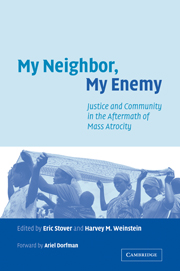Book contents
- Frontmatter
- Contents
- List of contributors
- Foreword by Ariel Dorfman
- Acknowledgments
- Introduction: conflict, justice and reclamation
- Part I Institutional approaches to justice
- Part II Social reconstruction and justice
- Part III Survivors and justice
- 13 Art out of the rubble
- 14 Trust and betrayal in war
- 15 Empathy and rehumanization after mass violence
- Conclusion: a common objective, a universe of alternatives
- Index
14 - Trust and betrayal in war
Published online by Cambridge University Press: 05 May 2010
- Frontmatter
- Contents
- List of contributors
- Foreword by Ariel Dorfman
- Acknowledgments
- Introduction: conflict, justice and reclamation
- Part I Institutional approaches to justice
- Part II Social reconstruction and justice
- Part III Survivors and justice
- 13 Art out of the rubble
- 14 Trust and betrayal in war
- 15 Empathy and rehumanization after mass violence
- Conclusion: a common objective, a universe of alternatives
- Index
Summary
Today, eleven years after the end of the war, Vukovar remains a ravaged and ethnically divided city. Indeed, when Croats and Serbs talk about the 1991 war within their own ethnic group, they invariably ask: “How could we have trusted them?” That such deep feelings of distrust and suspicion can exist in Vukovar, a city that once boasted one of the highest interethnic marriage rates in the former Yugoslavia, seems hard to fathom. So what happened? What caused neighbor to turn against neighbor? How could feelings of betrayal and distrust spread through a once harmonious community like a virulent cancer? And will it ever be possible for the residents of Vukovar to overcome a basic lack of trust and reconcile their differences?
In 2002, we set out to find answers to these questions through an interview study of forty-eight Croat and Serb residents of the city. We approached potential participants through two local recruiters who solicited participation on the basis of recommendations from one person to another, a recruiting process known as “snowball sampling.” Participants had to meet the following criteria: first, they must have lived in Vukovar for at least fifteen years prior to the outbreak of war in 1991. Second, during this time, they must have had close friends from the other ethnic group. Third, this relationship must have been severed or seriously threatened since 1991. The final sample consisted of an equal number of Serbs and Croats, from three age categories and three levels of education.
- Type
- Chapter
- Information
- My Neighbor, My EnemyJustice and Community in the Aftermath of Mass Atrocity, pp. 287 - 302Publisher: Cambridge University PressPrint publication year: 2004
- 16
- Cited by



